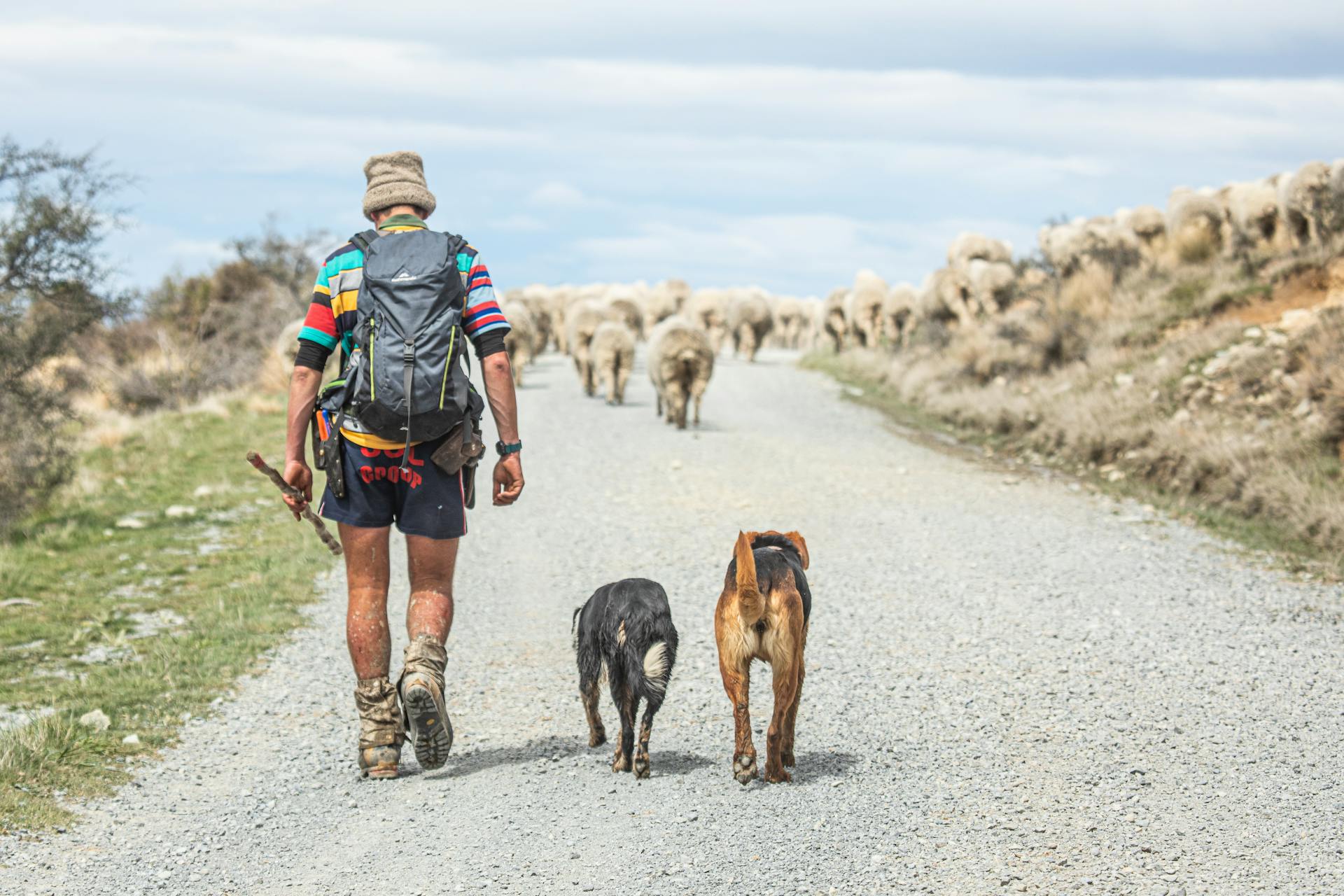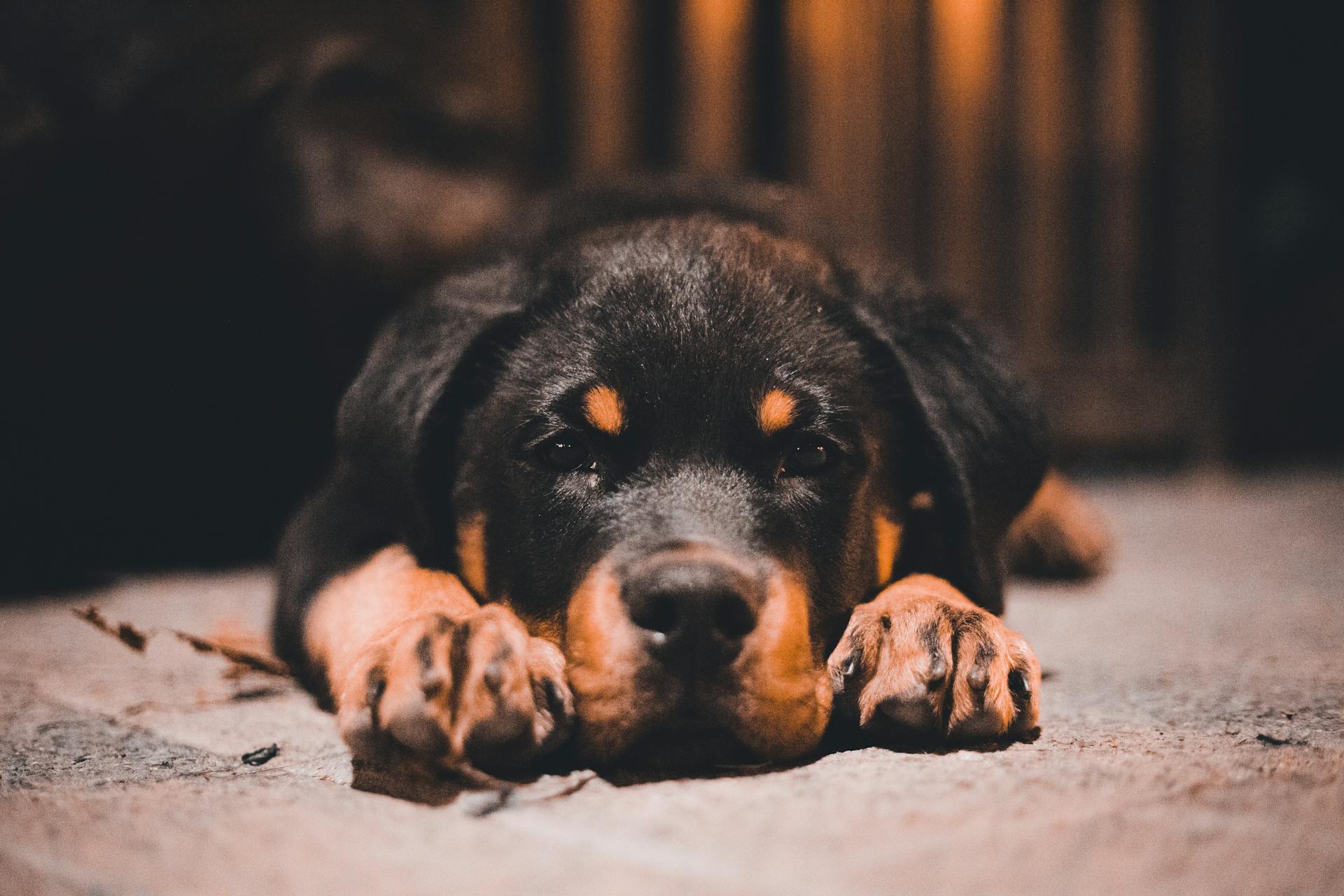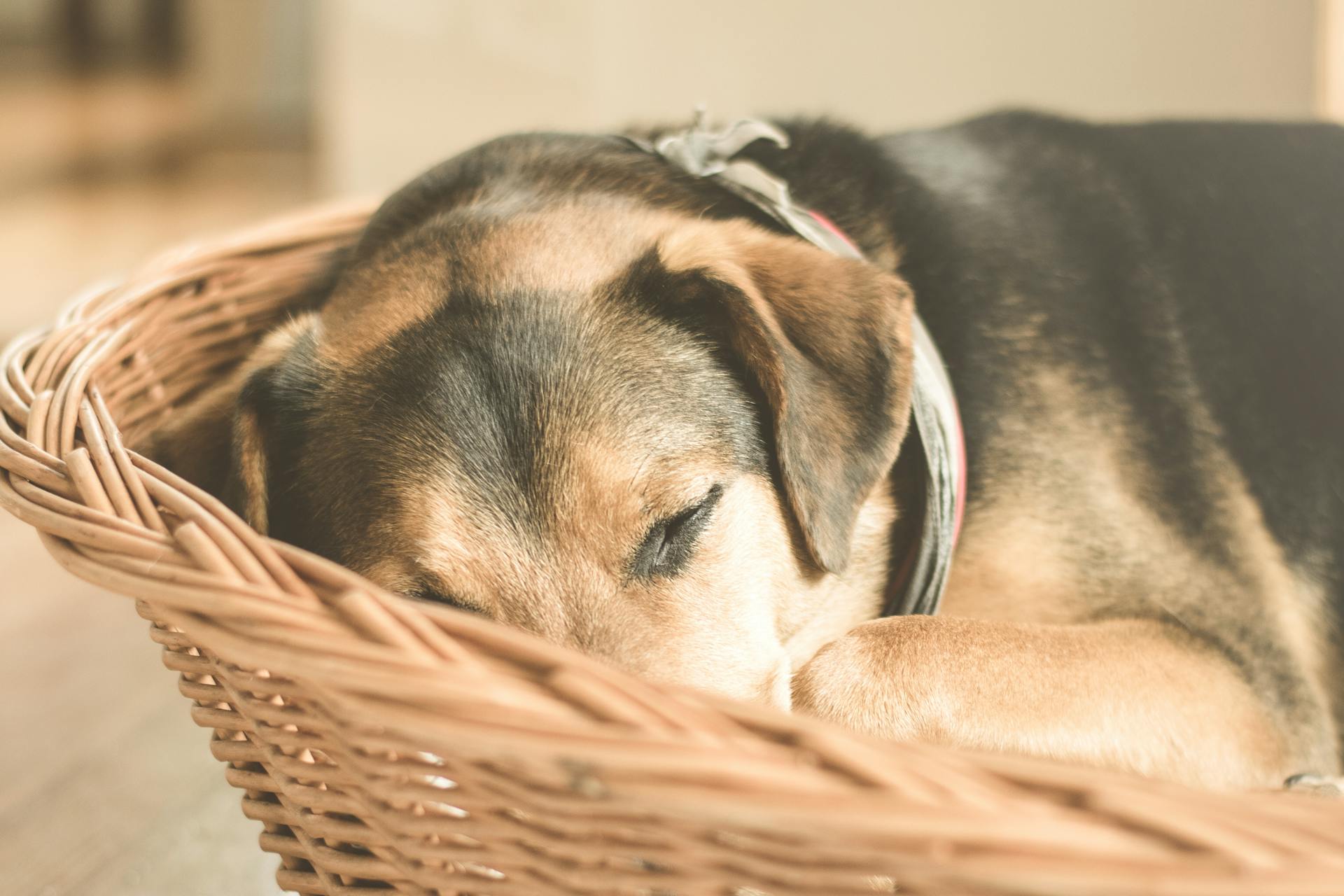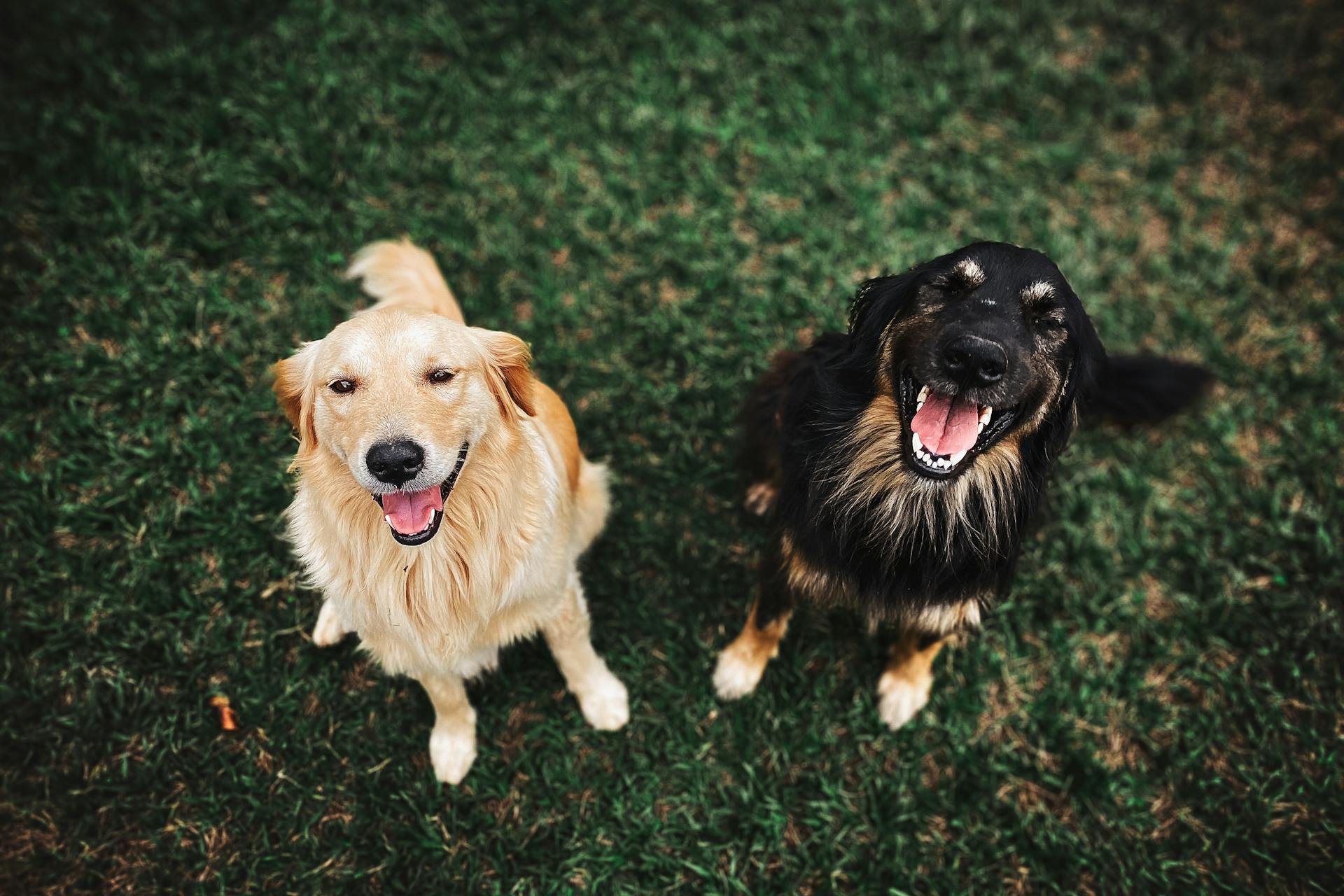
The Cane Corso is an ancient Italian breed known for its striking appearance and gentle nature. They're often referred to as "big black dog breeds" due to their large size and dark coat.
Cane Corsos are a muscular breed with a short, smooth coat that requires minimal grooming. Their short coat is one of the reasons they're a great choice for busy owners who don't want to spend a lot of time on dog grooming.
In terms of size, Cane Corsos can weigh between 90-120 pounds and stand between 24-27 inches tall at the shoulder. This makes them a substantial breed that requires plenty of space to move around.
One of the best things about Cane Corsos is their intelligence and trainability. They're highly responsive to positive reinforcement training and are known to form strong bonds with their owners.
Recommended read: Grooming a German Wirehaired Pointer
Pet Care Considerations
If you're considering bringing a Cane Corso into your home and family, it's essential to think about the responsibilities that come with owning one of these large, loyal canines.
Cane Corsos require a lot of exercise and need plenty of fenced-in space to run around. They thrive on human interaction, so be prepared to spend quality time with your pet.
Early socialization is crucial to prevent aggressive behavior and ensure your Cane Corso gets along with people and other animals. This includes introducing them to bathing, brushing, tooth brushing, and nail trimming from an early age.
A Cane Corso's smooth, short coat requires minimal grooming, but they do shed throughout the year, especially during the spring. Brushing them once or twice a week and occasional bathing should keep their coat looking sleek and clean.
Cane Corsos are prone to canine hip dysplasia, so it's essential to feed them large-breed puppy food to slow their growth rate and reduce the risk of this condition.
These dogs have a natural prey drive, so they may not be suitable for homes with very small children or pets. However, with proper training and socialization, they can be gentle with children and make great family pets.
Regular dental care is vital to prevent dental disease in Cane Corsos. Brush their teeth at least three times a week, and consider using dental chews to help reduce plaque build-up.
Take a look at this: Why Is My Dog's Chest so Big?
A Cane Corso's lifespan is approximately 9-12 years, which is a little longer than average for a giant-breed dog. They can adapt to extreme temperatures but typically do better in warmer climates.
With their large size and strong instinct to protect their family, it's essential to have a sturdy fence in the backyard to keep them safe and secure.
Temperament and Behavior
The Cane Corso's temperament reflects its long history as a guardian and warrior, making it naturally wary of strangers and other dogs. It's also fiercely loyal to its family.
This breed is not ideal for families with young children or the elderly, due to its strength and determination. It's also not well-suited for households with multiple dogs, especially those of the same sex.
A Cane Corso's energy level is about average, but it still requires regular exercise and training to keep it happy and healthy. With proper training and socialization, it can be a calm and confident companion.
These dogs are naturally alert to new people and situations, but they can become reactive if not properly trained and socialized. Early training and socialization are key to helping your Cane Corso become a well-adjusted member of your family.
The Cane Corso's intelligence makes it relatively easy to train, but it still requires patience and consistency from its owner. With positive reinforcement training, your Cane Corso can learn to ignore strangers and animals that pose no threat.
Black's Rise to Popularity
In the 1800s, Black Cane Corsos spread throughout the Italian peninsula, becoming known as the Cane Corso. Their power, strength, and intelligence made them highly prized.
Their intelligence is quite impressive, and it's no wonder they were soon in high demand. They spread to other parts of Europe.
A century later, the Cane Corso was in danger of disappearing due to World War II. This is a testament to the breed's resilience.
A group of enthusiastic Italian breeders took on the challenge of reviving the breed and promoting it as a working dog. Their efforts paid off, and the breed began to thrive once again.
Today, Black Cane Corsos are admired for their faithfulness and protectiveness.
Temperament and Behavior
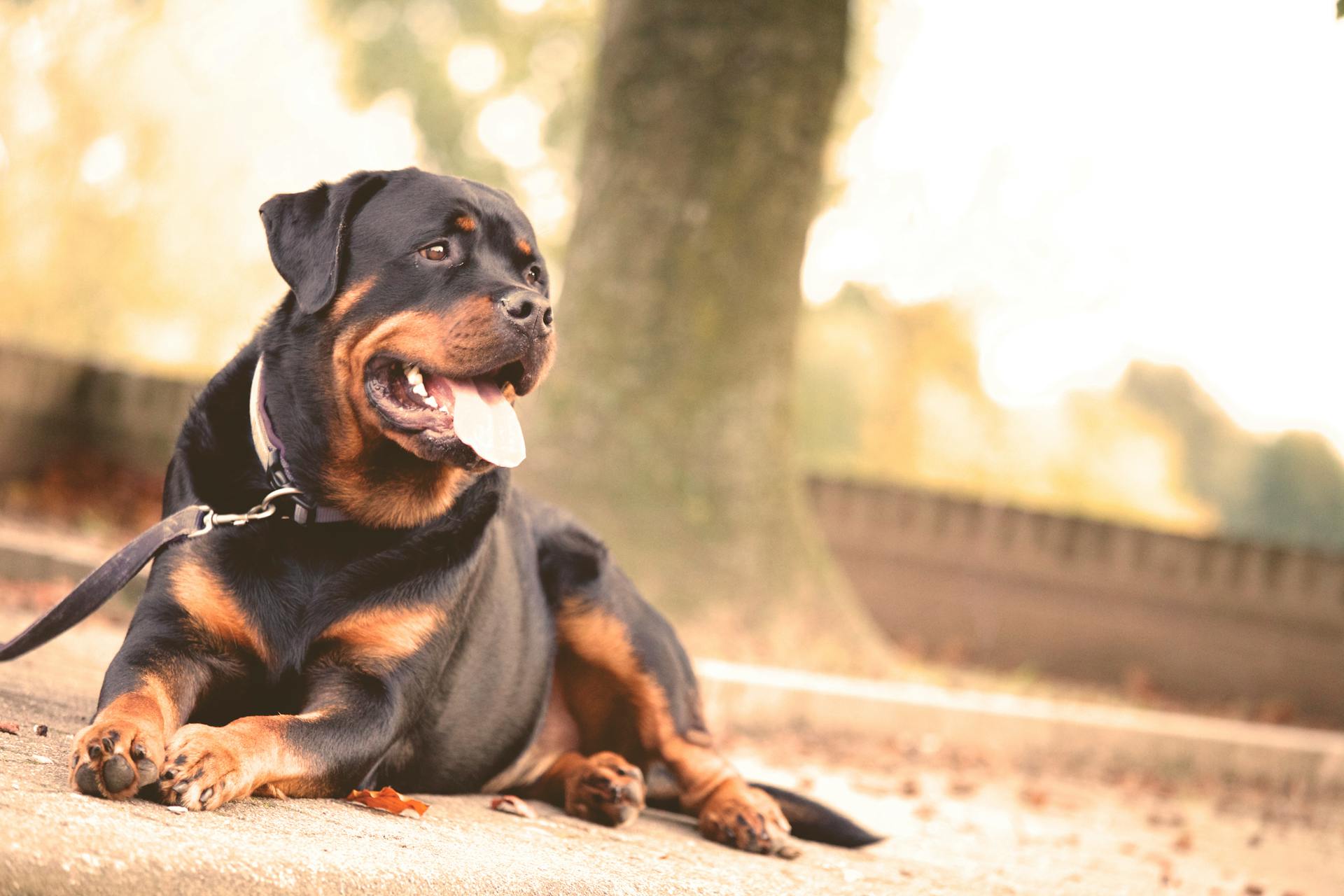
The Cane Corso is a breed that's not afraid to speak its mind, and it's not always a fan of strangers. It's naturally alert to new people coming to the house and may react if not properly trained and socialized.
With its strong guarding instinct, the Cane Corso is an excellent watchdog and can be a protection dog with training. But it's not the ideal breed for children or the elderly due to its strength and determination.
This breed is sensitive and serious, and its behavior largely depends on the care and training it receives when it's young. If you're inexperienced or unkind, the Cane Corso can become reactive.
The Cane Corso is a loyal and unwavering companion that enjoys having a family with children to watch over. However, its instinct to take charge can be an issue if you haven't invested in training.
These dogs must be socialized and trained with positive reinforcement starting at a very young age to be accepting of new people, animals, and situations. Training can start as soon as your new Cane Corso puppy comes home.
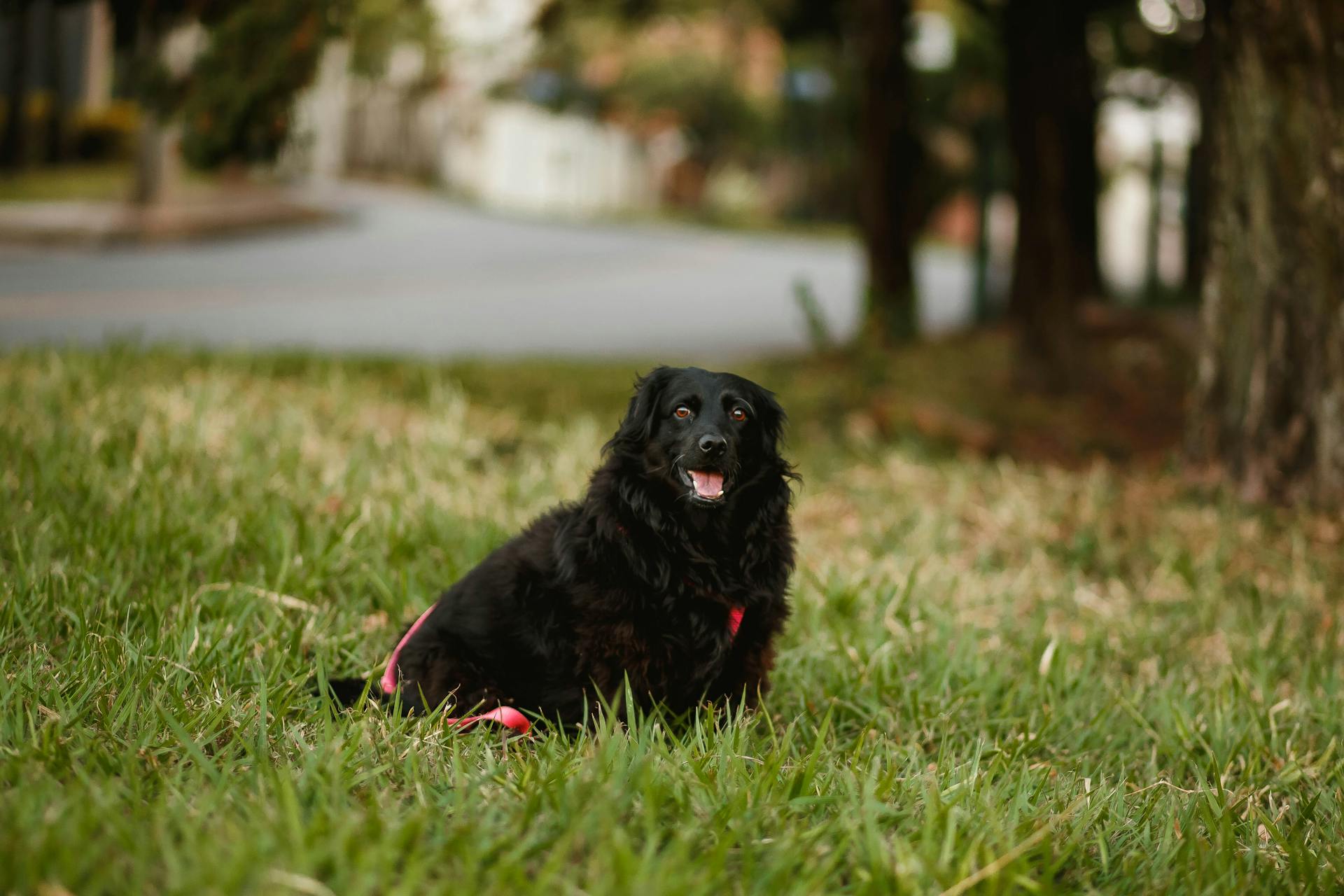
The Cane Corso is a quiet breed that tends to be reserved and confident. It's extremely attentive to its surroundings and can be gentle and affectionate in the right hands.
With proper care and training, the Cane Corso can be a calm and confident companion. But it's essential to supervise interactions with children or other pets and teach children how to properly interact with dogs.
The Cane Corso's high intelligence makes it easy to teach them the difference between friend and foe. So, with patience and consistency, you can help your Cane Corso become a loyal and loving companion.
Health and Nutrition
The Cane Corso is a large and powerful breed, but it's also prone to some health issues that can affect its lifespan and mobility. The average life expectancy of a Cane Corso is 9 to 12 years, but with proper care and nutrition, you can help your Corso live a long and healthy life.
Take a look at this: Life Expectancy for Boston Terrier
One of the most common health issues affecting Cane Corsos is obesity, which can lead to joint pain and mobility issues as they age. To prevent this, it's essential to maintain a healthy weight through a balanced diet and regular exercise.
A well-balanced diet is crucial for Cane Corsos, and it's recommended to feed them a high-quality, age-appropriate food that meets the nutritional standards established by the Association of American Feed Control Officials (AAFCO). You should also consider adding joint supplements, such as glucosamine and chondroitin, to support joint health.
Here are some key nutritional tips to keep in mind:
- Feed a large-breed formula that meets AAFCO standards.
- Consider adding joint supplements, such as glucosamine and chondroitin.
- Feed smaller meals throughout the day to prevent bloat and GDV.
Regular exercise and socialization are also essential for Cane Corsos, as they can be suspicious of strangers and may be difficult to walk on a leash. With proper care and attention, your Cane Corso can live a happy and healthy life.
Health Issues
Cane Corsos are generally a healthy breed, but like all breeds, they can be prone to certain health issues. Obesity is a significant problem in this breed, so it's essential to maintain a healthy weight through a proper diet and daily exercise.
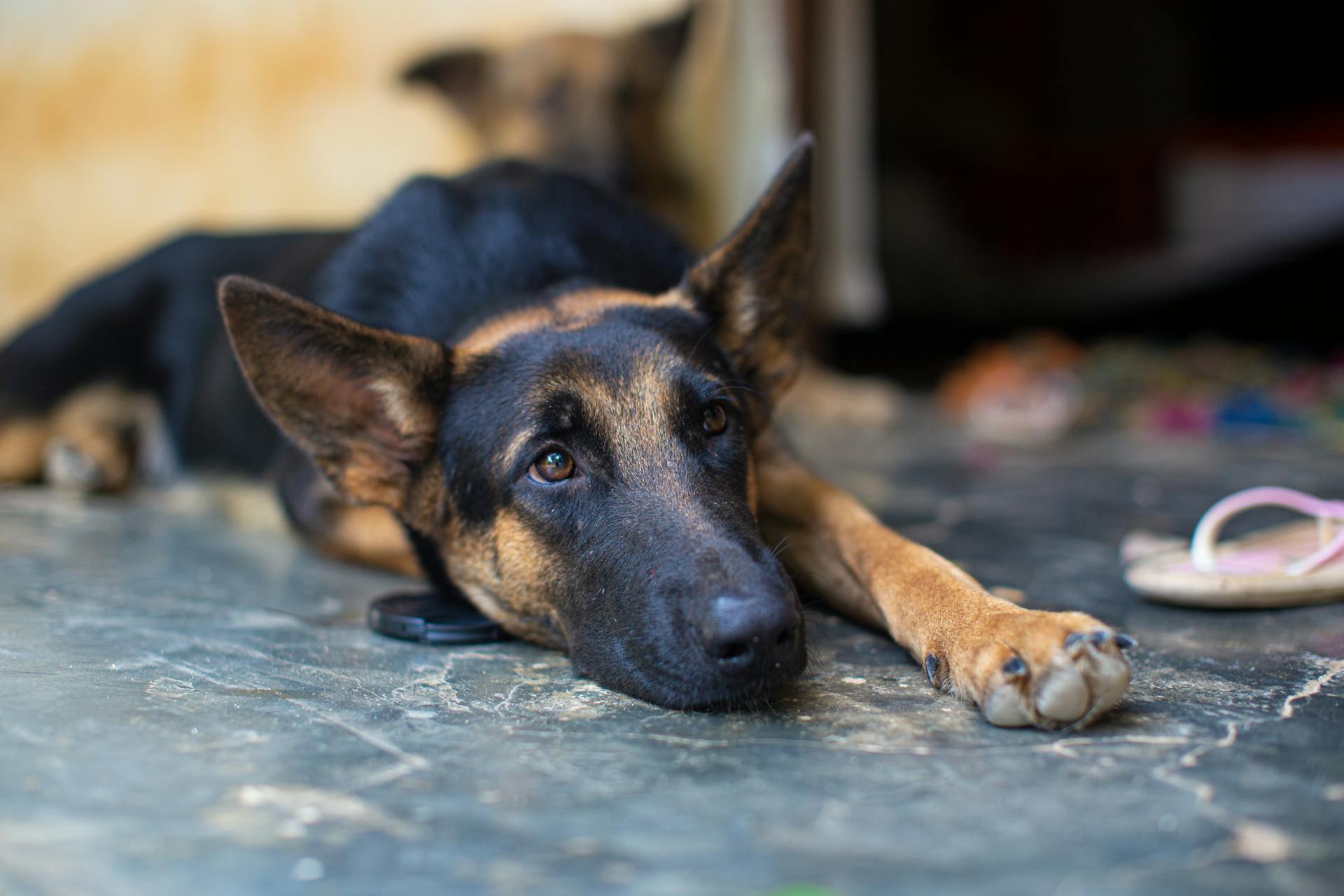
A well-balanced diet is crucial for your Cane Corso's health, and it's recommended to feed them a high-quality, age-appropriate food that meets nutritional standards established by the Association of American Feed Control Officials (AAFCO). This ensures your dog is getting the necessary nutrients for optimal health.
Cane Corsos are also susceptible to hip dysplasia, a skeletal condition that can lead to lameness, pain, and arthritis. Feeding a large-breed dog formula can help prevent this condition, and it's especially important for puppies to be fed a large- or giant-breed puppy formula to ensure normal growth of bones and joints.
Bloat is another serious health issue that can affect Cane Corsos, so it's essential to feed smaller, more frequent meals throughout the day. This can help prevent gastric dilatation and volvulus (GDV), a potentially deadly condition.
Epilepsy is another condition that can affect Cane Corsos, and it's usually hereditary. While there's no cure for this condition, it can be managed with medication, and dogs with epilepsy can still lead a long and happy life.
Eye problems are also common in Cane Corsos, particularly entropion, ectropion, and cherry eye. If you notice any unusual eye discharge, squinting, cloudiness, bulging, redness, or other symptoms, consult your veterinarian immediately.
Here are some common health issues that can affect Cane Corsos:
- Obesity
- Hip Dysplasia
- Bloat (GDV)
- Epilepsy (Idiopathic)
- Eye problems (Entropion, Ectropion, Cherry Eye)
By being aware of these potential health issues, you can take steps to prevent or manage them, ensuring your Cane Corso lives a long and happy life.
Dental Care
Taking care of your Cane Corso's teeth is crucial for their overall health. Brush their teeth two to three times per week to prevent plaque build-up and tartar formation.
They can also benefit from dental chews to help keep their teeth clean.
Related reading: Dogo Argentino Teeth
Return
As you return home from a long day, it's essential to provide your Cane Corso with a nutritious meal. The AKC breed standard allows for the ears to be cropped or uncropped, but many countries and states have banned ear cropping for medical and behavioral reasons.
A well-balanced diet is crucial for your Cane Corso's overall health. The Cane Corso's coat color types include black, fawn, gray, red, and various shades of brindle.
When it comes to their appearance, Cane Corsos are known for their majestic look, with a sturdy, muscular build. Lighter-color dogs typically have a gray mask over the eyes and muzzle.
A healthy Cane Corso needs regular exercise to maintain their physique. The AKC breed standard calls for the tail to be docked, but many countries and states have banned it for medical and behavioral reasons.
For more insights, see: English Springer Spaniel Colors Tri-color
A balanced diet should include essential nutrients to support your Cane Corso's overall health. The Cane Corso's coat length is short and stiff.
Here's a list of the essential nutrients your Cane Corso needs:
Providing your Cane Corso with a nutritious meal and regular exercise will help them maintain their majestic appearance and overall health.
Training and Care
Socialization is key when it comes to Cane Corso puppies, as they can be suspicious of strangers and may require extensive socialization to become confident and calm around new people and animals.
To walk a Cane Corso on a leash, a harness should never be used, as it makes it easier for the dog to pull.
Cane Corsos are intelligent and respond well to positive reinforcement training, which involves rewarding good behavior with treats and rewards.
A Cane Corso's energy and intensity need plenty of fenced-in space for exercise, and they require a good amount of exercise to keep up with their muscular shape.
Raising a Cane Corso puppy requires lots of socialization to help nip undesirable behaviors in the bud, and introducing them to as many kids, people, and pets as possible in a safe and positive manner is crucial.
Cane Corsos are not as toy-oriented as many other breeds, and most are not interested in retrieving, but they do enjoy agility training, skills training, and other activities that keep their mind enriched and their body fit.
A Cane Corso's coat is smooth and short, requiring minimal grooming, although they may require occasional bathing.
The most common Cane Corso colors are black and black brindle, but they can also be chestnut brindle, fawn, gray, gray brindle, and red.
A Cane Corso's lifespan is approximately 9–12 years, which is a little longer than average for a giant-breed dog.
Cane Corsos are happiest if you can give them a job to keep them occupied, such as obedience training, learning tricks, or dog sports.
Frequently Asked Questions
What dog looks like a Cane Corso but bigger?
Meet the Neapolitan Mastiff, a larger breed with a similar protective nature to the Cane Corso, known for its massive stature and distinctive wrinkled skin
Is a African Boerboel bigger than a Cane Corso?
The Cane Corso is smaller than the African Boerboel, but still a large and muscular breed. Typically weighing over 110 pounds, the Cane Corso is a substantial dog despite its size difference.
What is a black Cane Corso?
The Black Cane Corso is a large, ancient Italian breed known for its strength, intelligence, and loyalty. This powerful breed makes an excellent guard dog for families due to its devoted nature.
Featured Images: pexels.com
